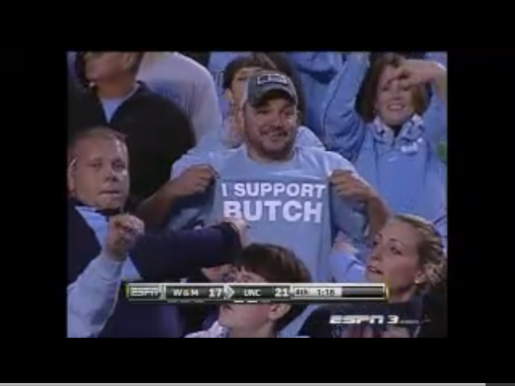During the last month or so, the decision was made that our UNC-CH football scandal coverage would yield the field in favor of more important things. Now that the basketball coaching situation has been settled and spring football practice is over, however, you can expect SFN to jump back on the UNC-CH football story. Included will be some recap articles covering things that broke during the dark period.
Today we learned that:
The University of North Carolina-Chapel Hill withheld documents that should have been provided to The News & Observer in response to an open-records lawsuit filed by a consortium of media groups led by The N&O and The Charlotte Observer against the university, Wake County Superior Court Judge Howard Manning ruled Tuesday.
and
Still to be decided is one major area of the lawsuit, which is the request for all documents relating to investigations into the UNC football program. Manning and the lawyers for both sides agreed at Friday’s hearing that it was necessary first to decide the three other areas of dispute — phone records, parking tickets and tutor identities.
For you legal types, here is the complaint.
WRAL posted a story with additional detail that included quotes from UNC-CH chancellor Holden Thorp.
“We are disappointed with the court’s apparent interpretation of the Family Educational Rights and Privacy Act (FERPA) as it applies to student records related to phone numbers and parking tickets,” said UNC chancellor Holden Thorp. “This has far-reaching implications for all of our students and their records that we believe federal law protects. When the judge’s instructions are finalized in an order, the University will review the ruling and evaluate its options for appeal.”
***UPDATE TO ADDRESS SOME QUESTIONS REGARDING THE LAW ON THIS SUBJECT*** (GAWolf)
In trying to educate myself on this FERPA issue, I ran across some very interesting sources of information. You absolutely must read this PDF of a Ferpa-related discussion by The Student Press Law Center. This paper is dead on point on discusses the rather lengthy expose done The Columbus Dispatch regarding Ohio State’s circumvention of Public Information Requests via FERPA. You absolutely should read the whole paper as it specifically addresses the application, or rather misapplication, of FERPA to athletic-related investigations.
Some excerpts from the above-linked Student Press Law Center paper to peak your interest:
When FERPA has been raised as an obstruction to journalists’
requests for public records, the courts have overwhelmingly applied a
narrow, common-sense reading of FERPA that covers only academic
and disciplinary records, or records of that nature, that directly identify
students. Nonetheless, many schools and colleges continue operating
under the oversimplified shorthand that if a document names or
refers to a student, it is a FERPA record, without exception.
In an award-winning 2009 investigative series,61 reporters Jill Ripenhoff
and Todd Jones of the Columbus Dispatch documented the
misuse of FERPA by college athletic departments to withhold records
that fall well outside the Senate sponsors’ definition of records “used
by the institution in making decisions that affect the life of the student.â€
The reporters encountered dozens of instances in which public
universities refused to release – or released only in heavily redacted
form – such documents as the passenger lists of football team flights,
recipients of complementary football tickets, and correspondence
with the NCAA regarding potential compliance violations.
The long history of well-documented excesses has led to calls for
FERPA reform. Following the Columbus Dispatch series, U.S. Sen.
Sherrod Brown, D-Ohio, wrote to the Department of Education urging
the agency to issue rules clarifying and narrowing the scope of
FERPA secrecy. “It is important that the public have confidence in the
integrity of our higher education system, which requires a measure of
transparency in reporting violations of the rules,†Brown wrote.62 As
of September 2010, neither the Department nor Congress has moved
to narrow or clarify FERPA, and the abuses continue.
My take on the information shared in the above-linked paper is pretty simple. That link is interesting in that most of the courts cited have significantly limited the scope of protection of FERPA. The OTHER interesting thing is that schools are not mandated to withhold releasing information, but rather the Feds can withdraw funding if they violate the terms. In other words, a university can release anything they want if they don’t mind possibly losing out on federal funding. So FERPA is not a mandate on school, it’s akin to the Feds using funding to dictate drinking ages, BAC levels on state DWI statutes, etc. Essentially, this the Federal government using money to override state laws (Freedom of Information Act) for whatever federal govenment interest.
It appears that over time schools have morphed the law into a shield when information could be detrimental… a la the UNC/FSU athletic scandals.
The kicker…. and here’s the real kicker in these FERPA-related cup-and-ball street games being used by Universities with something to hide. Guess how many times the Federal government has withheld federal funding to a University for violation of FERPA?
No, no. Guess again.
That’s right: never. Never! Never not once. Upon information and belief, the Feds have only sent barely over a 100 letters to schools saying they violated FERPA. Based on what we can find, the worst damage ever incurred by a University via the heavy hand of the federal government is to receive a letter stating the potential violations and a request to correct policies to become compliant.
SO THIS IS WHERE IT COULD GET A BIT HAIRY
Another exception to FERPA’s general prohibition against disclosure authorizes campus personnel to share information from student education records with other “school officials†who have “legitimate educational interests†in the information. Again, the act poorly defines who qualifies as a “school official†and what constitutes a “legitimate educational interest.†Recent guidance from the Family Policy Compliance Office (FPCO) offers some clarity. According to the
FPCO model definition, a “school official†is:
1. A person employed by the University in an administrative, supervisory, academic or research, or support staff position (including law enforcement unit personnel and health staff);
2. A person or company with whom the University has contracted as its agent to provide a service instead of using University employees or officials (such as an attorney, auditor, or collection agent);
3. A person serving on the Board of Trustees; or
4. A student serving on an official committee, such as a disciplinary or grievance committee, or assisting another school official in performing his or her tasks.
Looks like to me if the BOT or the BOD asked for this information, UNC could NOT hide behind FERPA even as they have misconstrued the law. There is an exception for other “school officials” with a “legitimate educational interest.”
Why hasn’t the BOD made an effort to get to the bottom of this issue. Don’t they want all UNC system students to receive proper and equal access to benefits and advantages? Don’t they have a “legitimate educational interest” in seeing that all UNC System students are getting a proper education devoid of cheating, financial influence, etc?
REGARDING PARKING TICKETS
When can campus administration or faculty have access to school police records?
If FERPA allows campus police and security to access student records, does it also allow school and college administrators and faculty to access campus police records? In fact it does: FERPA expressly does not apply to – and does not prohibit the disclosure of – records maintained by a school’s law enforcement unit. Like other terms in FERPA, which are defined broadly, “law enforcement unit” simply means the person, office or department authorized or designated to enforce laws or maintain the security and safety of the school.
While law enforcement records are accepted from FERPA’s reach, the exception only applies to records that (1) are created by a law enforcement unit, (2) are created for law enforcement purposes and (3) are actually maintained by the law enforcement unit. All these elements must be present in order for law enforcement records to be exempt from FERPA restrictions.
UNC HAS BEEN DOWN THIS ROAD BEFORE
When Anson Dorance was sued by a former player for sexual harassment, Title IX violations, etc., UNC attempted to use FERPA to release certain documents and deposition statements “under seal”. The plaintiff in the matter failed to take a stance on Defendant UNC’s motion to seal certain documents, so the court addressed the matter on its own accord. The reading is legalese at its finest, but the point is UNC has been shot down on this issue before.
See Jennings v. UNC-CH, 340 F. Supp. 2d 679 (2004).
In a nutshell, the Federal court (U.S. District Court, MD NC) followed the nation-wide, longtime lean to err on the side of disclosure stating a dicta-like test of “reasonable expectations of confidentiality.” The important language to be taken therefrom discusses what is and what is not an “educational record.” The M.D.N.C, like most, narrowly defined that which is an “educational record.” This case ultimately got beaten all over the court system for several years before Plaintiff Jennings prevailed to the tune of something close to three hundred bills.





You must be logged in to post a comment.